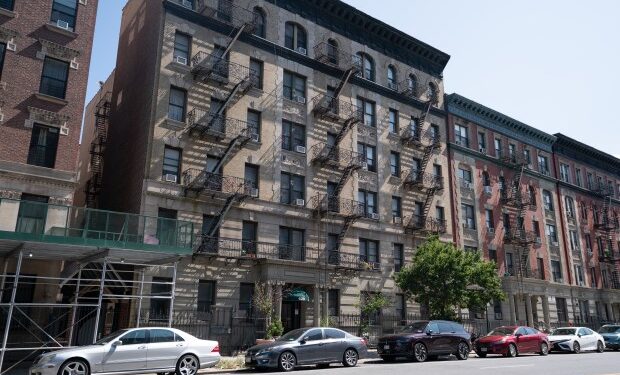A group of uptown Manhattan tenants filed a lawsuit Thursday that alleges their landlord engaged in a “systemic” scheme to raise their rents beyond the legal limit by claiming credit for fictitious building repairs — a case advocates say points to a need for stronger state housing law enforcement.
The suit, filed in Manhattan Supreme Court, seeks class-action status to represent hundreds of current and former rent-stabilized tenants at three buildings in Harlem and Hamilton Heights where the landlord allegedly perpetrated the scheme.
The buildings — the first located on Riverside Drive near W. 151st St, the second on W. 151st St. and the third on W. 135th Street — are owned by limited liability corporations whose managing member is Edward Ostad, says the lawsuit, which was filed with the help of Newman Ferrara, a Manhattan law firm. The suit names the LLCs as defendants, though not Ostad.
Ostad is a major real estate investor who owns dozens of buildings in the city, according to Property Shark, an industry data outfit. He couldn’t immediately be reached for comment Thursday.
Under state law, landlords can waive some rent stabilization protections, which curb increases at a set rate each year, if they perform significant apartment or building upgrades.

The group of seven stabilized tenants who filed Thursday’s suit allege in court papers that the Ostad-controlled entities have justified rent increases in dozens of units across the three buildings by claiming such building upgrades.
But the suit, which cites an investigation into the rent histories of 175 units at the three buildings by the Housing Rights Initiative watchdog group, alleges the landlord LLCs didn’t perform many of the property upgrades they cited as reason for the rent hikes. In many instances, the landlord removed rent stabilization protections entirely by citing the allegedly fake upgrades, according to the suit.
In one especially egregious example, the landlord of the Riverside Drive address is accused of having removed stabilization rights for Tatiana Cruz-Jimenez, a third-floor tenant in the building who’s one of the suit’s named plaintiffs, based on a renovation that would’ve by law needed to cost at least $117,730 to lift the protections. However, the suit says Buildings Department records show only $40,000 worth of improvements were actually carried out.
In other instances, the Ostad entities are accused of having illegally ended stabilization in some units by not informing new tenants of the existing regulations.
The Housing Rights Initiative investigation cited in the suit found the named plaintiffs and other similarly situated are collectively owed at least $1 million in rent refunds and rent reductions due to the allegedly unlawful deregulation moves.

In a statement, the Housing Rights Initiative said the alleged flouting of rent stabilization laws by the Ostad entities “is a testament to the failures of the regulators who are meant to enforce these laws.”
The group argued the State Division of Housing and Community Renewal, which is responsible for enforcing New York’s rent stabilization laws, should be able to detect and crack down on these types of alleged violations on its own — and faulted Gov. Hochul for not doing more to beef up such enforcement.
“When a landlord illegally overcharges a tenant in rent, they aren’t just stealing that tenant’s money, they’re stealing their food, their education, their health care, and their quality of life,” said Aaron Carr, the watchdog group’s founder and executive director. “Gov. Hochul likes to present herself as a tough-on-crime governor, but she’s one of the weakest governors we’ve ever had on real estate crime.”
Hochul’s office didn’t return a request for comment, but a spokeswoman for the State Division of Housing and Community Renewal defended her agency’s work and said it has on its own returned nearly $13.2 million in rent overcharges to New York tenants over the past five years.
“The Office of Rent Administration, within New York State Housing and Community Renewal, continues to ensure the laws governing rent regulation are properly administered and enforced; that includes proactive audits, investigations, and other enforcement activities to protect millions of tenants and New York’s rent regulated housing stock,” said the spokeswoman, Charni Sochet.

The lawsuit comes as the city continues to face a severe housing shortage — as well as an uptick in evictions amid skyrocketing rents.
Public data shows city marshals completed some 12,000 residential evictions in 2023, nearly tripling the number from the year before, when pandemic-era protections against evictions were still in place.
At the same time, rents are surging, as the number of apartments available for rent have dropped to historic lows.
A study from StreetEasy and Zillow released this spring found rents grew more than seven times faster than wages in the city last year, the largest discrepancy out of any of the country’s 50 largest metro areas.
Hochul, as well as Mayor Adams, have argued the solution to the dire housing crisis is building more apartments across the board.
But Lucas Ferrara, a partner at Newman Ferrara who’s representing the plaintiffs in the new suit, argued ensuring rent stabilization laws and other tenant protections are properly enforced must be part of a housing crisis solution too. “This case reinforces that avarice has no place when it comes to implementing our state’s rent laws,” said Ferrara.
Originally Published:






